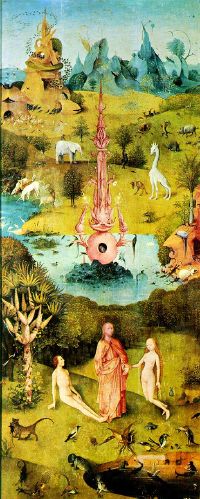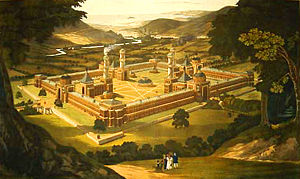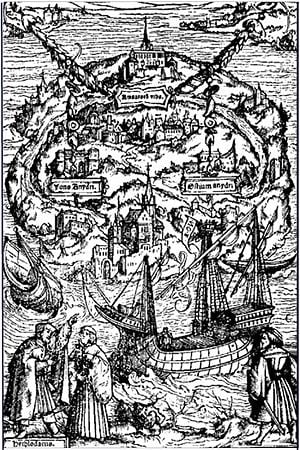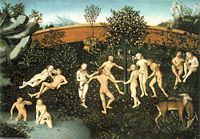Difference between revisions of "Utopia" - New World Encyclopedia
Keisuke Noda (talk | contribs) (imported from wiki) |
m ({{Contracted}}) |
||
| Line 1: | Line 1: | ||
| + | {{Contracted}} | ||
{{otheruses}} | {{otheruses}} | ||
Revision as of 21:38, 11 December 2006
- For other uses, see Utopia (disambiguation).

Utopia, in its most common and general positive meaning, refers to an imaginary, ideal civilization, which may range from a city to a world, regarded to be attainable in the future by some.
Human efforts to create a better, or perhaps perfect society are called utopianism. Ideas which could be/are considered able to radically better the world are often called utopian ideas.
"Utopian" in a negative meaning is used to discredit ideas as too advanced, too optimistic or unrealistic and impossible to realize. Hence, for example, the use by Marxists, of such expressions as "utopian socialism".
It has also been used to describe actual communities founded in attempts to create such a society in order to better themselves in an economic and political fashion. Although some authors have described their utopias in detail, and with an effort to show a level of practicality, the term "utopia" has come to be applied to notions that are (supposedly) too optimistic and idealistic for practical application. Utopia, however, is difficult to achieve.
Related terms
- Dystopia is a negative utopia: a world wherein utopian ideals have been subverted. example: George Orwell's 1984, Aldous Huxley's Brave New World.
- Eutopia is a positive utopia, roughly equivalent to the regular use of the word "utopia".
- Outopia is argued to be the word "Utopia" was derived from, coming from the latin 'Uo-' for "no" and '-topos' for "place" bringing a meaning of "no place" a fictional, non-realistic place
- Heterotopia, the "other place", with its real and imagined possibilities (a mix of "utopian" escapism and turning virtual possibilities into reality) — example: cyberspace. Samuel R. Delany's novel Trouble on Triton is subtitled An Ambiguous Heterotopia to highlight that it is not strictly utopian (though certainly not dystopian). The novel offers several conflicting perspectives on the concept of utopia.
- Ourtopia combines the English 'our' with the Greek 'topos' to give 'our place'—the nearest thing to a utopian planet that is actually attainable.
Other subcategories include Arcadias and Cockaygnes. Ruth Levitas is one who has developed such a categorization.
More's Utopia
St. Thomas More depicts a rationally organized society, through the narration of an explorer who discovers it - Raphael Hythlodaeus.
Utopia is largely based on Plato's Republic. It is a perfect version of Republic wherein the beauties of society reign (eg: equalism and a general pacifist attitude), although its citizens are all ready to fight if need be. The evils of society, eg: poverty and misery, are all removed. It has few laws, no lawyers and rarely sends its citizens to war, but hires mercenaries from among its war-prone neighbors (these mercenaries were deliberately sent into dangerous situations in the hope that the more war-like populations of all surrounding countries will be weeded out, leaving peaceful peoples). The society encourages tolerance of all religions, but not of atheism, since the people believe that a man must fear some God, else he shall act evilly and their society will weaken. Some readers have chosen to accept this imaginary society as the realistic blueprint for a working nation, while others have postulated More intended nothing of the like. Some maintain the position that More's Utopia functions only on the level of a satire, a work intended to reveal more about England than about an idealistic society. This interpretation is bolstered by the title of the book and nation, and its apparent derivation from the Greek for "no place" and "good place": "Utopia" is a compound of the syllable eu, meaning good, and topos, meaning place. But the homonymous prefix ou, with the meaning "no," also resonates in the word: the perfectly "good place" is really "no place.
Types of utopia
Economic utopia
These utopias are based on economics. Most of them formed in response to the harsh economic conditions of the 19th century. Particularly in the early nineteenth century, several utopian ideas arose, often in response to the social disruption created by the development of commercialism and capitalism. These are often grouped in a greater "utopian socialist" movement, due to their shared characteristics: an egalitarian distribution of goods, frequently with the total abolition of money, and citizens only doing work which they enjoy and which is for the common good, leaving them with ample time for the cultivation of the arts and sciences. One classic example of such a utopia was Edward Bellamy's Looking Backward. Another socialist utopia is William Morris' News from Nowhere, written partially in response to the top-down (bureaucratic) nature of Bellamy's utopia, which Morris criticized. However, as the socialist movement developed it moved away from utopianism; Marx in particular became a harsh critic of earlier socialisms he described as utopian. (for more information see the History of Socialism article)
Utopias have also been imagined by the opposite side of the political spectrum. For example, Robert A. Heinlein's The Moon Is a Harsh Mistress portrays an individualistic and libertarian utopia. Capitalist utopias of this sort are generally based on perfect market economies, in which there is no market failure—or the issue of market failure is never addressed, any more than socialist utopias address the issue of planning failures. Also consider Eric Frank Russell's book The Great Explosion (1963) whose last section details an economic and social utopia. This forms the first mention of the idea of Local Exchange Trading Systems (LETS).
Political and historical utopia
Political utopias are ones in which the government establishes a society that is striving toward perfection. With that said, many such governments tend to be harsh in its execution of laws and allow little individualism if it conflicts with its primary goals. Many strive for a controlled society where the state or government replaces religious and family values (and loyalties for that matter).
A global utopia of world peace is often seen as one of the possible inevitable endings of history.
Sparta was a militaristic utopia founded by Lycurgus (though some, especially Athenians, may have thought it was rather a dystopia). It was a Greek power until its defeat by the Thebans at the battle of Leuctra.
Religious utopia

These utopias are based on religious ideals, and are to date those most commonly found in human society. Their members are usually required to follow and believe in the particular religious tradition that established the utopia. Some permit non-believers or non-adherents to take up residence within them; others (such as the Community at Qumran) do not.
The Jewish, Christian and Islamic ideas of the Garden of Eden and Heaven may be interpreted as forms of utopianism, especially in theirfolk-religious forms. Such religious "utopias" are often described as "gardens of delight", implying an existence free from worry in a state of bliss or enlightenment. They postulate existences free from sin, pain, poverty and death, and often assume communion with beings such as angels or the houri. In a similar sense the Hindu concept of Moksha and the Buddhist concept of Nirvana may be thought of as a kind of utopia.
However, the usual idea of Utopia, which is normally created by human effort, is more clearly evident in the use of these ideas as the bases for religious utopias, as members attempt to establish/reestablish on Earth a society which reflects the virtues and values they believe have been lost or which await them in the Afterlife.
In the United States and Europe during the Second Great Awakening of the nineteenth century and thereafter, many radical religious groups formed utopian societies. They sought to form communities where all aspects of people's lives could be governed by their faith. Among the best-known of these utopian societies was the Shaker movement, which originated in England in the 18th century but moved to America shortly after its founding.
(See also: End of the world, Eschatology, Millennialism, Utopianism)
Scientific and technological utopia
These are set in the future, when it is believed that advanced science and technology will allow utopian living standards; for example, the absence of death and suffering; changes in human nature and the human condition. These utopian societies tend to change what "human" is all about. Technology has affected the way humans have lived to such an extent that normal functions, like sleep, eating or even reproduction, has been replaced by an artificial means. Other kinds of this utopia envisioned, incments, and a significant body of religious and secular literature, based upon the idea of a Utopia on earth. Utopianism is the opposite of a Dystopia. In a Utopic Society, everyone's needs are met, and all rights upheld.
In many cultures, societies, religions and cosmogonies, there is some myth or memory of a distant past when humankind lived in a primitive and simple state, but at the same time one of perfect happiness and fulfillment. In those days, the various myths tell us, there was an instinctive harmony between man and nature. Men's needs were few and their desires limited. Both were easily satisfied by the abundance provided by nature. Accordingly, there were no motives whatsoever for war or oppression. Nor was there any need for hard and painful work. Humans were simple and pious, and felt themselves close to the gods.
These mythical or religious archetypes are inscribed in all the cultures and resurge with special vitality when people are in difficult and critical times. However, the projection of the myth does not take place towards the remote past, but either towards the future or towards distant and fictional places (for example, The Land of Cockaygne, a straightforward parody of a paradise), imagining that at some time of the future, at some point of the space or beyond the death must exist the possibility of living happily.
These myths of the earliest stage of humankind have been referred to by various names, as the following examples will demonstrate:
Golden Age
The Greek poet Hesiod, around the 8th century B.C.E., in his compilation of the mythological tradition (the poem Works and Days), explained that, prior to the present era, there were other four progressively most perfect ones, the oldest oicted in all the other accounts mentioned above. Cockaygne is a land of extravagance and excess rather than simplicity and piety. There is freedom from work, and every material thing is free and available. Cooked larks fly straight into one's mouth; the rivers run with wine; sexual promiscuity is the norm; and there is a fountain of youth which keeps everyone young and active.
There is a medieval poem (c. 1315) written in rhyming couplets which is entitled "The Land of Cokaygne":
- Far in the sea, to the west of Spain,
- Is a country called Cokaygne.
- There's no land not anywhere,
- In goods or riches to compare.
- Though Paradise be merry and bright
- Cokaygne is of far fairer sight....
Finding utopia
All these myths also express some hope that the idyllic state of affairs they describe is not irretrievably and irrevocably lost to mankind, that it can be regained in some way or other.
One way would be to look for the earthly paradise — for a place like Shangri-La, hidden in the Tibetan mountains and described by James Hilton in his Utopian novel Lost Horizon (1933). Such paradise on earth must be somewhere if only man were able to find it. Christopher Columbus followed directly in this tradition in his belief that he had found the Garden of Eden when, towards the end of the 15th century, he first encountered the New World and its peoples.
Another way of regaining the lost paradise (or Paradise Lost, as 17th century English poet John Milton calls it) would be to wait for the future, for the return of the Golden Age. According to Christian theology, man's Fall from Paradise, caused by man alone when he disobeyed God ("but of the tree of the knowledge of good and evil, thou shalt not eat of it"), has resulted in the wickedness of character that all human beings have been born with since ("Original Sin")such as Orwell's Nineteen Eighty-Four became the primary method of Utopian expression and rejection. (Kumar 1987)
Still, post-war era also found some Utopianist fiction for some future harmonic state of humanity (e.g. Demolition Man (film)).
Characteristics of Fictional Utopia
Many works of utopian fiction depict an outsider, a time-traveler or a foreigner, who can be shown the features of the society so that they can be shown to the reader.
Virginia Woolf was deeply critical of the level of characterization shown in many utopias, flatly asserting in her 1924 essay "Character in Fiction," "There are no Mrs. Browns in Utopia."
Examples of utopia
- New Australia
- Plato's Republic (400 B.C.E.) was, at least on one level, a description of a political utopia ruled by an elite of philosopher kings, conceived by Plato. (Compare to his Laws, discussing laws for a real city.) a Gutenburg text of the book
- The City of God (written 413–426) by Augustine of Hippo, describes an ideal city, the "eternal" Jerusalem, the archetype of all "Christian" utopias.
- Utopia (1516) by Thomas More a Gutenberg text of the book
- Reipublicae Christianopolitanae descriptio (Beschreibung des Staates Christenstadt) (1619) by Johann Valentin Andreæ, describes a Christian religious utopia inhabited by a community of scholar-artisans and run as a democracy.
- The Anatomy of Melancholy (1621) by Robert Burton, a utopian society is described in the preface.
- The City of the Sun (1623) by Tommaso Campanella depicts a theocratic and communist society.
- The New Atlantis (1627) by Francis Bacon
- Oceana (1656 the Integral, praising the efficiency, the rationality, and the happiness that life within the confines of the One State can bring to those worlds the Integral will someday visit.
- Aldous Huxley's Brave New World (1932) can be considered an example of pseudo-utopian satire (see also dystopia). One of his other books, Island (1962), demonstrates a positive utopia.
- Shangri-La described in the novel Lost Horizon by James Hilton (1933)
- Islandia (1942), by Austin Tappan Wright, an imaginary island in the Southern Hemisphere, a utopian containing many Arcadian elements, including a rejection of technology.
- B. F. Skinner's Walden Two (1948)
- The Cloud of Magellan (1955) by Stanisław Lem
- Andromeda Nebula (1957) is a classic communist utopia by Ivan Efremov
- The Great Explosion, Eric Frank Russell 1963 In the last section setting out a workable utopian economic system leading to a different social and political reality.
- The Corridors of Time by Poul Anderson (1965) features a protagonist recruited by a woman from a future society to go back in time to help her fight her dystopian, time-traveling foes, who dominate half the world in her time. The utopian claims of her society are undermined, especially by time-travelers from a more distant, actually utopian future who plunge him into aspects of it hidden from him, and hint that their future must be brought about by his actions.
- Star Trek (1966) science fiction television series by Gene Roddenberry
- Imagine (song) (1971) by John Lennon, prays for brotherhood of man which would exist in a utopia without hell or heaven.
- The Ones Who Walk Away From Omelas (1969), by Ursula K. Le Guin, describes what some would call a very close to perfect society but only , edited by Kim Stanley Robinson
- The Kingdom of Zeal in Chrono Trigger (1995) is a utopian society.
- The Hedonistic Imperative (1996), an online manifesto by David Pearce, outlines how genetic engineering and nanotechnology will abolish suffering in all sentient life.
- The Kin of Ata Are Waiting for You (1997) by Dorothy Bryant
- The Matrix (1999), a film by the Wachowski brothers, describes a virtual reality controlled by artificial intelligence such as Agent Smith. Smith says that the first Matrix was a utopia, but humans rejected it because they "define their reality through misery and suffering." Therefore, the Matrix was redesigned to simulate human civilization with all its suffering.
- Equilibrium (2002), is a film and describes a future in which feelings are forbidden. The movie is strongly influenced by Brave New World (above), the dystopian 1984 by George Orwell and the dystopian Fahrenheit 451 by Ray Bradbury.
- Xen: Ancient English Edition, (2004) is a novel about a true Utopia, with a bias toward Matriarchy, in the distant future of Earth, "translated" by D.J. Solomon
- Ourtopia,(2004) is not escapist, but Garrett Jones's practical projection of the ideal planet we should be working towards (paperback or etext available from author's website).
- Ensaio sobre a Lucidez ("Treatise on Lucidity") by José Saramago (2004), describes a city where there is 83% of blank votes at an election.
- Globus Cassus, (2004), is a project for the transformation of the Earth into a large, hollow structure inhabited on the inside, which would be organised by new types of societies and political systems.
- The first story arc in the seventh season (2004-2005) of the supernatural dramedy series Charmed involves the transformation of tdge the world into utopia through the fear of a common enemy.
Related terms and concepts
- Abolitionism
- Bioregionalism
- Christian anarchism
- Dystopia
- Ecotopia
- El Dorado
- Eutopia
- Garden of Eden
- Heaven
- Heterotopia - physical locale set apart from traditional public life where rules and expectations are suspended, often to address moments of crisis or deviance, developed by Michel Foucault
- Intentional Community
- Kibbutz
- Millennialism
- Omnitopia - a structural and perceptual enclave whose apparently distinct locales convey inhabitants to a singular place. Etymologically, the term reflects a neologism of the Latin omni (all; ‘in all ways or places’ or ‘of all things’) and the Greek topos (place).
- Outopia
- Peace
- Regional planning
- Simple living
- Techno-utopianism
- Urban planning
- Utopia Planitia
- Utopian and dystopian fiction
- Utopian socialism
- Utopianism
ReferencesISBN links support NWE through referral fees
- Kumar, Krishan (1991) Utopianism (Milton Keynes: Open University Press) ISBN 0-335-15361-5
- Manuel, Frank & Manuel, Fritzie (1979) Utopian Thought in the Western World (Oxford: Blackwell) ISBN 0-674-93185-8
- Kumar, K (1987) Utopia and Anti-utopia in Modern Times (Oxford: Blackwell) ISBN 0-631-16714-5
Links on utopia
- Full text of Thomas More's Utopia from Project Gutenberg
- Utopia - The Columbia Encyclopedia, Sixth Edition, 2001
- Society for Utopian Studies is the Main Page for the Society for Utopian Studies, an international, interdisciplinary association devoted to the study of utopianism in all its forms, with a particular emphasis on literary and experimental utopias.
- [http://www.abolitionist-soci
sr:Утопија
Credits
New World Encyclopedia writers and editors rewrote and completed the Wikipedia article in accordance with New World Encyclopedia standards. This article abides by terms of the Creative Commons CC-by-sa 3.0 License (CC-by-sa), which may be used and disseminated with proper attribution. Credit is due under the terms of this license that can reference both the New World Encyclopedia contributors and the selfless volunteer contributors of the Wikimedia Foundation. To cite this article click here for a list of acceptable citing formats.The history of earlier contributions by wikipedians is accessible to researchers here:
The history of this article since it was imported to New World Encyclopedia:
Note: Some restrictions may apply to use of individual images which are separately licensed.

